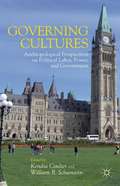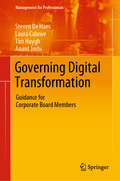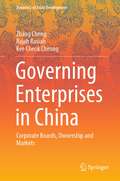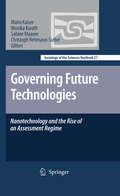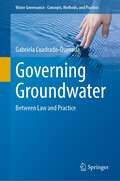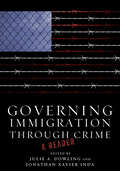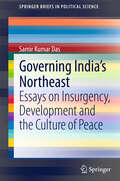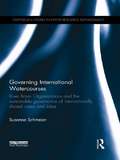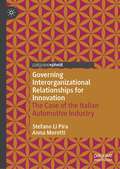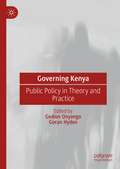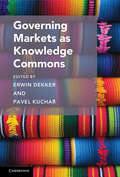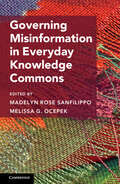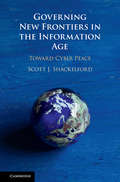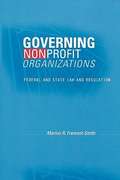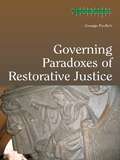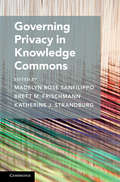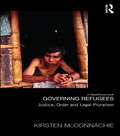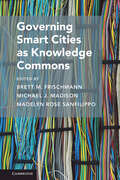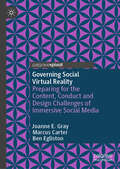- Table View
- List View
Governing Cultures
by Kendra Coulter William R. SchumannBy assembling original, ethnographically-grounded research in legislatures, executives, and bureaucracies, this volume illuminates and unpacks the structures, practices, and values of government actors in local, regional, and national contexts.
Governing Digital Transformation: Guidance for Corporate Board Members (Management for Professionals)
by Anant Joshi Tim Huygh Steven De Haes Laura CaluweThis title provides clear and readily applicable guidance to corporate board members on the involvement of boards of directors in information technology (IT) governance. Specifically, it demonstrates ways in which board members can execute IT duties effectively. Specific tools such as a roadmap towards digital transformation and a board-level dashboard for digital strategy and oversight are also offered. While organizations are increasingly dependent on IT for the creation of business value, the evidence seems to indicate that boards of directors are not as involved in IT-related strategic decision-making and control as they should be. Research shows that high levels of board-level IT governance, regardless of existing IT needs, will improve organizational performance. This book provides unique insights into the inner workings of a specific board of directors group, with a focus on its IT governance structures and processes.
Governing Digitally Integrated Genetic Resources, Data, and Literature
by Tom Dedeurwaerdere Paul F. Uhlir Reichman, Jerome H. and Uhlir, Paul F. and Dedeurwaerdere, Tom Jerome H. ReichmanThe free exchange of microbial genetic information is an established public good, facilitating research on medicines, agriculture, and climate change. However, over the past quarter-century, access to genetic resources has been hindered by intellectual property claims from developed countries under the World Trade Organization's TRIPS Agreement (1994) and by claims of sovereign rights from developing countries under the Convention on Biological Diversity (CBD) (1992). In this volume, the authors examine the scientific community's responses to these obstacles and advise policymakers on how to harness provisions of the Nagoya Protocol (2010) that allow multilateral measures to support research. By pooling microbial materials, data, and literature in a carefully designed transnational e-infrastructure, the scientific community can facilitate access to essential research assets while simultaneously reinforcing the open access movement. The original empirical surveys of responses to the CBD included here provide a valuable addition to the literature on governing scientific knowledge commons.
Governing Enterprises in China: Corporate Boards, Ownership and Markets (Dynamics of Asian Development)
by Rajah Rasiah Kee Cheok Cheong Zhang ChengThis book examines the nature of the marketization of corporate boards following the introduction of the split share reform, corporate board and shareholder relations, corporate performance, and risk-taking conduct in China. The chapters cover topics such as determinants of corporate board size and independence, corporate risk-taking conduct under different controlling shareholder types. The book deepens our understanding of corporate governance mechanisms as most previous studies have limited their findings using mainstream perspectives grounded on neoclassical theory. It outlines that China’s corporate board composition is determined by the board’s scope of operation, monitoring, bargaining power, and other governance mechanisms and regulations. It also offers a comparison between China’s experience with other economies in general and other transition economies in particular. As such, the book represents an essential overview of the current concerns regarding corporate governance in China. It is of great interest to legal researchers, policymakers, and legal practitioners working with business investments in China.
Governing Failure
by Jacqueline BestJacqueline Best argues that the changes in International Monetary Fund, World Bank and donor policies in the 1990s, towards what some have called the 'Post-Washington Consensus,' were driven by an erosion of expert authority and an increasing preoccupation with policy failure. Failures such as the Asian financial crisis and the decades of despair in sub-Saharan Africa led these institutions to develop governance strategies designed to avoid failure: fostering country ownership, developing global standards, managing risk and vulnerability and measuring results. In contrast to the structural adjustment era when policymakers were confident that they had all the answers, the author argues that we are now in an era of provisional governance, in which key actors are aware of the possibility of failure even as they seek to inoculate themselves against it. This book considers the implications of this shift, asking if it is a positive change and whether it is sustainable.
Governing Future Technologies
by Christoph Rehmann-Sutter Sabine Maasen Mario Kaiser Monika KurathNanotechnology has been the subject of extensive 'assessment hype,' unlike any previous field of research and development. A multiplicity of stakeholders have started to analyze the implications of nanotechnology: Technology assessment institutions around the world, non-governmental organizations, think tanks, re-insurance companies, and academics from science and technology studies and applied ethics have turned their attention to this growing field's implications. In the course of these assessment efforts, a social phenomenon has emerged - a phenomenon the editors define as assessment regime. Despite the variety of organizations, methods, and actors involved in the evaluation and regulation of emerging nanotechnologies, the assessment activities comply with an overarching scientific and political imperative: Innovations are only welcome if they are assessed against the criteria of safety, sustainability, desirability, and acceptability. So far, such deliberations and reflections have played only a subordinate role. This book argues that with the rise of the nanotechnology assessment regime, however, things have changed dramatically: Situated at the crossroads of democratizing science and technology, good governance, and the quest for sustainable innovations, the assessment regime has become constitutive for technological development. The contributions in this book explore and critically analyse nanotechnology's assessment regime: To what extent is it constitutive for technology in general, for nanotechnology in particular? What social conditions render the regime a phenomenon sui generis? And what are its implications for science and society?
Governing Groundwater: Between Law and Practice (Water Governance - Concepts, Methods, and Practice)
by Gabriela Cuadrado-QuesadaThis book empirically examines a diverse range of groundwater issues and different approaches to deal with such concerns taking into account responses from government bodies, community organizations, scientists, private sector, and academia. The overarching objective of this book is to empirically examine groundwater governance and groundwater law. It aims to provide a better understanding of the complexities surrounding groundwater governance in order to reconceptualize and retheorize the governance of subterranean resources having as entry points equity and sustainability concerns. This involves understanding what people do when using, sharing, protecting, and measuring groundwater; and why do they do what they do, i.e., what are their motivations to resort to certain practices. This is done through the comparative and contrasting investigation of six case studies from countries from the Global North and Global South. It offers a different perspective of literature given that it explains how groundwater governance and law are in practice rather than what they should be. Additionally, the research presented in this book provides ideas on how to rethink the design and implementation of groundwater law grounded on empirically based descriptions and the understanding of groundwater problems.
Governing Immigration Through Crime: A Reader
by Julie A. Dowling Jonathan Xavier IndaIn the United States, immigration is generally seen as a law and order issue. Amidst increasing anti-immigrant sentiment, unauthorized migrants have been cast as lawbreakers. Governing Immigration Through Crime offers a comprehensive and accessible introduction to the use of crime and punishment to manage undocumented immigrants. Presenting key readings and cutting-edge scholarship, this volume examines a range of contemporary criminalizing practices: restrictive immigration laws, enhanced border policing, workplace audits, detention and deportation, and increased policing of immigration at the state and local level. Of equal importance, the readings highlight how migrants have managed to actively resist these punitive practices. In bringing together critical theorists of immigration to understand how the current political landscape propagates the view of the "illegal alien" as a threat to social order, this text encourages students and general readers alike to think seriously about the place of undocumented immigrants in American society.
Governing India's Northeast
by Samir Kumar DasThis book focuses on issues of governance and the nature and complexities of social transformation in India's Northeast -- a 'problem' zone for policymakers -- particularly since the early 1990s. While governance is the thread that runs through the volume, the latter at one level addresses the challenges of governing in global times a region historically marked by acute violence, interethnic conflict and insurgency; and at another, traces macro changes in the very forms and technologies of governance. The essays in this volume point to how changing forms and technologies of governing insurgency, development and culture do not remain mere instruments of peace, but define the very nature and content of both peace and conflict and their interrelationship in the region.For the first time in the history of scholarship on the region, the three crucial issues of insurgency, development and culture have been analysed through the lens of governance. This volume, therefore, marks an important addition to the scholarship on the region.
Governing International Watercourses: River Basin Organizations and the Sustainable Governance of Internationally Shared Rivers and Lakes (Earthscan Studies in Water Resource Management)
by Susanne SchmeierThis book focuses on River Basin Organizations as the key institutions for managing internationally shared water resources. This includes a comparative analysis of all River Basin Organizations worldwide and three in-depth case studies from three different continents. The detailed case studies are the Senegal (West Africa), Mekong (South-east Asia) and Danube (Europe) rivers. The book contributes to the academic debate on how shared natural and environmental resources can be managed in a sustainable way and which institutional and legal mechanisms actually matter for doing so. It adopts the neo-institutionalist approach, according to which international environmental institutions do make a difference. The analysis not only confirms this argument for the specific case of shared water resources, but also refines existing hypotheses on the influence of different independent variables, namely the nature of the collective action problem, the constellation of actors and the institutional design of an international environmental institution. The work also contributes to the policy debate on how to better govern internationally shared natural resources and the environment. It provides policy makers with advice on which exogenous conditions to be aware of when managing water resources they share with co-riparians and which institutional design features and governance mechanisms to set up in order to increase effectiveness in management.
Governing Interorganizational Relationships for Innovation: The Case of the Italian Automotive Industry
by Anna Moretti Stefano Li PiraThis book explores the governance mechanisms and their implications for interorganizational relationships (IORs) in the context of disruptive technological change, with a focus on the automotive industry's transition to electric vehicles (EVs). It delves into the different forms of governance, including contractual and relational mechanisms, and the levels of codification within IORs. It addresses the gap in understanding the impact of disruptive innovation on IORs and highlights the need for strategies to effectively adapt and adjust relationships in the face of transformative changes. The research examines the interplay between disruptive forces and governance, providing insights into how firms can navigate and thrive amidst disruptions. By analysing the dynamics of governance mechanisms and their value in IORs, this book offers practical insights for organizations engaged in interorganizational relationships. It is targeted at researchers and scholars in the fields of strategic management, organizational theory, and innovation, as well as professionals involved in managing interorganizational relationships and navigating disruptive environments.
Governing Kenya: Public Policy in Theory and Practice
by Goran Hyden Gedion OnyangoThis book is authored by some of the renowned scholars in Africa who take on the task to understand how Kenya is governed in this century from a public policy perspective. The book’s public policy approach addresses three general and pertinent questions: (1) how are policies made in a political context where change is called for, but institutional legacies tend to stand in the way? (2) how are power and authority shared among institutional actors in government and society? and, (3) how effective is policymaking at a time when policy problems are becoming increasingly complex and involving multiple stakeholders in Africa? This book provides an updated and relevant foundation for teaching policy, politics and administration in Kenya. It is also a useful guide for politicians, the civil society, and businesses with an interest in how Kenya is governed. Furthermore, it addresses issues of comparability: how does the Kenyan case fit into a wider African context of policymaking? ‘This volume is a major contribution to comparative policy analysis by focusing on the policy processes in Kenya, a country undergoing modernization of its economic and political institutions. Written by experts with a keen eye for the commonalities and differences the country shares with other nations, it covers a range of topics like the role of experts and politicians in policymaking, the nature of public accountability, the impact of social media on policy actors, and the challenges of teaching policy studies in the country. As a first comprehensive study of an African nation, Governing Kenya will remain a key text for years to come’. —Michael Howlett, Burnaby Mountain Chair of Political Science, Simon Fraser University, Canada ‘A superb example of development scholarship which sets aside ‘best practice’ nostrums and focuses on governance challenges specific to time and place while holding on to a comparative perspective. Useful to scholars and practitioners not only in Kenya but across developing areas. I strongly recommend it!’ —Brian Levy teaches at the School of Advanced International Studies, Johns Hopkins University, USA, and the University of Cape Town, South Africa. ‘This book is an exploration of important deliberations - of interest for those of us interested in deepening the understanding of public policy theories and their application within a specific African setting’. —Wilson Muna, Lecturer of Public Policy, Kenyatta University, Nairobi, Kenya ‘This collection of think pieces on public policy in Kenya gives the reader theoretical and practical hooks critical to the analysis of the implementation of the sovereign policy document in Kenya, the 2010 Constitution’. —Willy Mutunga, Chief Justice & President of the Supreme Court, Republic of Kenya, 2011-2016 ‘Governing Kenya provides a comprehensive analysis of public policymaking in Kenya. The book integrates public policy theory with extensive empirical examples to provide a valuable portrait of the political and economic influences on policy choices in this important African country. The editors have brought together a group of significant scholars to produce an invaluable contribution to the literature on public policy in Africa’. —B. Guy Peters, Maurice Folk Professor of American Government, University of Pittsburgh, USA
Governing Markets as Knowledge Commons (Cambridge Studies on Governing Knowledge Commons)
by Erwin Dekker Pavel KuchařKnowledge commons facilitate voluntary private interactions in markets and societies. These shared pools of knowledge consist of intellectual and legal infrastructures that both enable and constrain private initiatives. This volume brings together theoretical and empirical approaches that develop and apply the Governing Knowledge Commons framework to the evolution of various kinds of shared knowledge structures that underpin exchanges of goods, services, and ideas. Chapters offer vivid and illuminating case studies that illustrate this conceptual framework. How did pooling scientific knowledge enable the Industrial Revolution? How do social networks underpin the credit system enabling the Agra footwear market? How did the market category Scotch whisky emerge and who has access to it? What is the potential of blockchain-ledgers as shared knowledge repositories? This volume demonstrates the importance of shared knowledge in modern society.
Governing Misinformation in Everyday Knowledge Commons (Cambridge Studies on Governing Knowledge Commons)
by Madelyn R. Sanfilippo Melissa G. OcepekGoverning Misinformation in Everyday Knowledge Commons delves into the complex issue of misinformation in our daily lives. The book synthesizes three scholarly traditions - everyday life, misinformation, and governing knowledge commons - to present 10 case studies of online and offline communities tackling diverse dilemmas regarding truth and information quality. The book highlights how communities manage issues of credibility, trust, and information quality continuously, to mitigate the impact of misinformation when possible. It also explores how social norms and intentional governance evolve to distinguish between problematic disinformation and little white lies. Through a coproduction of governance and (mis-)information, the book raises a set of ethical, economic, political, social, and technological questions that require systematic study and careful deliberation. This title is also available as Open Access on Cambridge Core.
Governing New Frontiers in the Information Age: Toward Cyber Peace
by Scott J. ShackelfordMany pressing environmental and security threats now facing the international community may be traced to the frontiers. From climate change and cyber-attacks to the associated challenges of space weaponization and orbital debris mitigation, solutions to all of these issues have at their root some form of regulation over the 'global commons'. Yet governance over these spaces is now transitioning away from multilateral treaties to regional and bilateral accords. This book makes an original contribution by comparing and contrasting some of the principal issues facing the frontiers. It analyzes how and why existing governance structures are often failing to adequately meet global collective action problems, with special coverage on cybersecurity and Internet governance. It proposes a new way forward incorporating lessons from successful regimes as well as the interdisciplinary scholarship on polycentric governance, arguing that multi-stakeholder collaboration is imperative in order to avoid tragedies of the global commons.
Governing Nonprofit Organizations: Federal and State Law and Regulation
by Marion R. Fremont-SmithThe nonprofit sector is a vital component of our society and is allowed the greatest freedom to operate. The public understandably assumes that since nonprofit organizations are established to do good, the people who run nonprofits are altruistic, and the laws governing nonprofits have reflected this assumption. But as Marion Fremont-Smith argues, the rules that govern how nonprofits operate are inadequate, and the regulatory mechanisms designed to enforce the rules need improvement. Despite repeated instances of negligent management, self-interest at the expense of the charity, and outright fraud, nonprofits continue to receive minimal government regulation. In this time of increased demand for corporate accountability, the need to strengthen regulation of nonprofits is obvious. Fremont-Smith addresses this need from a historical, legal, and organizational perspective. She combines summaries and analysis of the substantive legal rules governing the behavior of charitable officers, directors, and trustees with descriptions of the federal and state regulatory schemes designed to enforce these rules. Her unique and exhaustive historical survey of the law of nonprofit organizations provides a foundation for her analysis of the effectiveness of current law and proposals for its improvement.
Governing Paradoxes of Restorative Justice
by George PavlichRestorative justice is the policy of eschewing traditional punishments in favour of group counselling involving both victims and perpetrators. Until now there has been no critical analysis of governmental rationales that legitimize restorative practices over traditional approaches but Governing Practices of Restorative Justice fills this gap and addresses the mentalities of governance most prominent in restorative justice. The author provides comprehensible commentary on the central images of this discursive arena in a style accessible to participants and observers alike of restorative justice.
Governing Police Stops Across Europe (Palgrave's Critical Policing Studies)
by Elizabeth Aston Mike Rowe Genevieve Lennon Sofie De Kimpe János FazekasThis book takes a critical and comparative approach to the analysis of the governance of police stops across Europe. It draws on an EU COST Action research network on Police Stops which engaged academics and practitioners from 29 countries to better understand the practice of police stops. It begins by examining how police stops are defined and the various legal rules and levels of accountability afforded. The chapters are arranged by theme to focus on a core aspect of the governance of police stops. These include: legal frameworks and police discretion; internal governance; external accountability and civilian oversight; possibilities for legal recourse; and the different roles of data and technology. Each compares the distinct approaches evident across Europe, often employing case studies. The book adopts a critical approach, acknowledging governance as contested and involving diverse (state, non-state and supranational) actors. It considers implications for policing in a rapidly changing environment globally.
Governing Privacy in Knowledge Commons (Cambridge Studies on Governing Knowledge Commons)
by Katherine J. Strandburg Madelyn Rose Sanfilippo Brett M. FrischmannGoverning Privacy in Knowledge Commons explores how privacy impacts knowledge production, community formation, and collaborative governance in diverse contexts, ranging from academia and IoT, to social media and mental health. Using nine new case studies and a meta-analysis of previous knowledge commons literature, the book integrates the Governing Knowledge Commons framework with Helen Nissenbaum's Contextual Integrity framework. The multidisciplinary case studies show that personal information is often a key component of the resources created by knowledge commons. Moreover, even when it is not the focus of the commons, personal information governance may require community participation and boundaries. Taken together, the chapters illustrate the importance of exit and voice in constructing and sustaining knowledge commons through appropriate personal information flows. They also shed light on the shortcomings of current notice-and-consent style regulation of social media platforms. This title is also available as Open Access on Cambridge Core.
Governing Refugees: Justice, Order and Legal Pluralism (Law, Development and Globalization)
by Kirsten McConnachieRefugee camps are imbued in the public imagination with assumptions of anarchy, danger and refugee passivity. Governing Refugees: Justice, Order and Legal Pluralism challenges such assumptions, arguing that refugee camps should be recognized as spaces where social capital can not only survive, but thrive. This book examines camp management and the administration of justice in refugee camps on the Thailand-Burma border. Emphasising the work of refugees themselves in coping with and adapting to encampment, it considers themes of agency, sovereignty and legal pluralism in an analysis of local governance and the production of order beyond the state. Governing Refugees will appeal to anyone with relevant interests in law, anthropology and criminology, as well as those working in the area of refugee studies.
Governing Risk in Gm Agriculture
by Michael Baram Mathilde BourrierThis book addresses the issues and methods involved in governing risks posed by genetically modified (GM) agriculture. It examines the evolution of policies intended to ensure the safety of GM crops and food products in the United States and Europe and the regulatory approaches and other social controls employed to protect human health, the environment, conventional farming and foods, and the interests and rights of consumers. Discussion encompasses the cultural, political, and economic forces that shape the design and application of the methods of risk governance, as well as other contextual features such as the influence of multinational companies seeking acceptance of their GM ventures. This discussion also examines the influence of the dynamic public discourse fostered by progressive concepts of risk governance and the approaches taken to meet its demands for transparency, public participation, and appropriate consideration of public perceptions and values despite conflicting views of experts.
Governing Risks (The International Library of Essays in Law and Society)
by Pat O'MalleyContemporary law and government are increasingly characterized by a focus on risk. Fields such as health, psychiatry, criminal justice, vehicle safety, urban design and environmental governance all provide examples of settings in which problems are dealt with as risks. While risk has become more prominent, there have also been changes in the nature of risk techniques deployed. Whereas welfare states provided many services through socialized risk - such as social insurances covering health, employment and old age - increasing emphasis is now placed on individual risk management arrangements such as private insurance. In this environment, the positive side of risk has also been made more salient. Enterprise, innovation and risk-taking have become qualities valued, or even required, of current governance. In this volume, the most influential examinations and interpretations of this major trend have been brought together, in order to make clear the range and diversity, the spread and penetration of risk in contemporary societies.
Governing Smart Cities as Knowledge Commons (Cambridge Studies on Governing Knowledge Commons)
by Madelyn Rose Sanfilippo Brett M. Frischmann Michael J. MadisonThe rise of 'smart' – or technologically advanced – cities has been well documented, while governance of such technology has remained unresolved. Integrating surveillance, AI, automation, and smart tech within basic infrastructure as well as public and private services and spaces raises a complex set of ethical, economic, political, social, and technological questions. The Governing Knowledge Commons (GKC) framework provides a descriptive lens through which to structure case studies examining smart tech deployment and commons governance in different cities. This volume deepens our understanding of community governance institutions, the social dilemmas communities face, and the dynamic relationships between data, technology, and human lives. For students, professors, and practitioners of law and policy dealing with a wide variety of planning, design, and regulatory issues relating to cities, these case studies illustrate options to develop best practice. Available through Open Access, the volume provides detailed guidance for communities deploying smart tech.
Governing Social Virtual Reality: Preparing for the Content, Conduct and Design Challenges of Immersive Social Media
by Marcus Carter Joanne E. Gray Ben EglistonIn this ground-breaking book, we navigate the uncharted terrain of social virtual reality (VR), a technology that, while offering unprecedented immersive experiences, brings forth significant governance challenges. By merging theoretical insights with practical examples, the book examines the risks of harm in social VR environments, including both content and conduct issues. It charts a course for developing inclusive and safe social VR spaces that are respectful of diverse users’ rights and needs, laying out essential principles for policymakers, developers and regulators. The book is an urgent call to proactively shape the burgeoning field of VR for the betterment of all.
Governing The Workplace: The Future Of Labor And Employment Law
by Paul C. WeilerLabor lawyer Paul Weiler examines the social and economic changes that have profoundly altered the legal framework of the employment relationship. He not only discusses a wide range of issues, from wrongful dismissal to mandatory drug testing and pay equity, but he also develops a blueprint for the reconstruction of the law of the workplace, especially designed to give American workers more effective representation.
